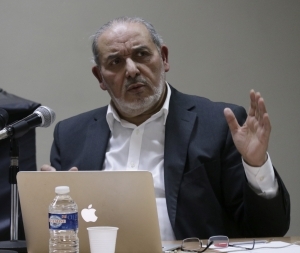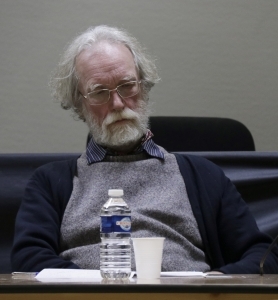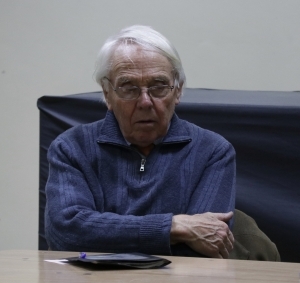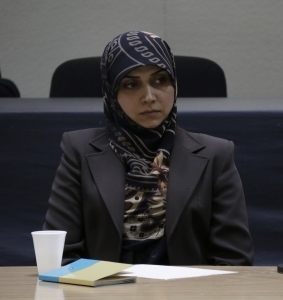Open Discussions/Gulf Cultural Club
Inter-faith Discussion
to mark Mohammad and Jesus birth anniversaries
Faith in Action
Personal experiences in religious social works
and aspirations for a more spiritual, less material world
Alan Murray *
Anfal Al Mousawi **
Revd David Tuck ***
Ashur Shamis****
[youtube youtubeurl=”RI4gpwUI7rA” ][/youtube]
This is a time when people of faith need to feel proud of their religious identities. As Christians await Christmas to celebrate the birth of Jesus Christ, Muslims will have celebrated the birth of Mohammad. Both religions have an abundance of rich traditions, spirituality and moral values. It is the time for their followers to come together and share these valuable treasures. The seminar is a get-together event to exchange ideas on commonalities, shared spiritual experiences and aspirations for a better future for the human race.
19th December, 2017
 Ashoor Al Shamis: We have two terms in Islam: Islam means submission; iman means faith. What people see from Muslims they consider to be Islamic behaviour. Islam is outward action or behaviour.
Ashoor Al Shamis: We have two terms in Islam: Islam means submission; iman means faith. What people see from Muslims they consider to be Islamic behaviour. Islam is outward action or behaviour.
This entails the following: To profess there is no God but God and Mohammad is his prophet and messenger.The second thing is to observer prayers. It is not the same as the Christian rituals. It entails reciting the Quran, prostration, performed individually or in a group.
The second is to spend alms, the fourth is to fast during Ramadan. The last is to go to Hajj once in a life time. Whoever does these things is a Muslim regardless of what is in his heart.
Faith is Iman, it is what you have inside you and is known only by you and God. It is internal belief. It is reflected in your behaviour.
It consists in belief in the following; the five pillars of Islam as mentioned. First to believe in Allah and in Mohammad. God exists and He is in charge of this world. No one has authority without his Then you have the kooks; the Turah, the Gospel and Quran
Thirdly is to believe in His messengers. They lived in this world and acted in accordance with God’s commands. And to believe in life after death.
The last thing is to believe in destiny, what happens to you is destiny; good or bad.
We may be able to explain the physical phenomenon but not the reasons behind them.
Islam is outward, iman is inward, internal. One is practical the other is abstract. All believers are Muslims, but not all the Muslims are believers. How is iman reflected in action?
Mohammad said: “By God you will not enter Paradise until you believe, and you won’t be true believers unless you love each other. Spread peace among yourselves.”
We are used to saying: ‘ Peace be upon you’ to everybody and greeting one another with salam, peace. People feel re-assured
Islam recognises the weaknesses. Nobody is a believer if he commits fornication. As long as he is engaged he is not a believer. It also condemns stealing.
The Quran says: ‘The Arabians claim to have believed, No, say them: You have not believed but we became Muslims.’ They accepted outward Islam but it has not been established in their hearts. To have proper Islam you have to test it inside you.
In order to fulfil these conditions you have to work hard. It is an open-ended process. Mohammad referred to 72 grades of faith; the least of them is to clear litter from public walk ways. Then he says: ‘Modesty is branch of faith.’
The prophet was keen to instil in us three grades; excellence, faith and submission. Morals, values and actions stem from the spirit of Islam. Faith is the bridge linking submission to God.
Your faith is the parameter that guides you in life. The Prophet said ‘ None of you is a believer until the message becomes his, until he loves for his brother what he loves for himself.’
Iman and good action are linked together. A whole chapter in the Qur’an is called Believers; It describes them. You have to believe every single moment of your life. Without this dynamic faith we lack the ingredients of faith.
 Alan Murray: I am a lay reader in my church at Finsbury Park where we have a partnership with local mosques. One of them was under leadership which was not amenable to interfaith dialogue.
Alan Murray: I am a lay reader in my church at Finsbury Park where we have a partnership with local mosques. One of them was under leadership which was not amenable to interfaith dialogue.
I spent some time in Algeria. I had the experience which I share with you of going to another country where my religion was in a small minority. I loved the country.
The birth of Jesus is something which starts with the prenounciation by the Angel to Mary that she would be pregnant when she was not married. She was going to be an unmarried mother. She was also poor. When they arrived in Bethlehem she was going to give birth but there was no room for her.
That is one aspect of the story of Mary. She is common to our two religions. She is also the Queen of Heaven. She was raised up and her name in Greek is Theotocus, mother of God, She is something of flesh but also the bearer of God. That summarises the important thing about Christianity. Religion anchored in human nature and Trinity which is far removed from the everyday existence of flesh. Those aspects of Christianity are fundamental to our faith.
When we meet in dialogue like this, and I belong to a church which is committed to dialogue, we need to share our experiences. We experience knowledge at the birth of Mohamad. These facts motivate us.
We need to emphasise the values we share. These are shared by all religions and by atheists also. Those are values which are fundamental to society; the love of God and the love of our neighbour. This means shared belief in social action; care for the poor, the sick and the hungry.
We get to know each other more when we act. It is good to listen to each other but when we do things together we learn more and go deeper together. Over past 10 years we have been suffering from the effects of a downward economic crisis. More people are suffering. We have a network of self-kitchens; people get soup, sandwiches and hot meals. This was one of the things we discussed with mosques. The two mosques said they wanted to join this activity.
That is what we did. On Thursdays, it is the day of the mosques. Many people who need food and comfort go there. This provided a deepening of understanding each other and our faiths. Dialogue is important, vital in fact. By working together we get a better understanding and relations.
Anfal Al Mousawi: We have Shia and Sunni sects in Islam with small differences. Every human needs God, Allah or Khoda. Most verses address the believers; all of them. We have many verses addressing the believers and they make it a condition that they act well, then they don’t have to worry.
I grew up in Holland, and was the only girl with hijab. In the 1990s I heard bad words from others who hated hijab. I understand what hijab means. I have to be human outside the home. I have to cover myself but without hindrance.
Before Islam there was bad treatment of women. I had friends who were Christians and Jews.
Imam Ali said: People are of two kinds; either brothers in religion or your equals in creation.
I have to respect them.
Our belief is not complete if you do not love for others what you love for yourselves.
The other verse says:’ O people; we made you from man and women and made you communities and tribes in order to know each other.’
It is good to have dialogue among ourselves but we have to act. Last week I was filming the distribution of 15000 roses among people. One woman said to me: ‘you are bad, you killed people.’ We were smiling to others.
A good word is a gracious act. Moses and his brother were told to speak to Pharaoh in a good way. Prayers are important in Islam. But prayers must prevent you from committing bad acts. Some people pray but commit bad acts. Real prayers must stop a person from committing bad acts.
An Important thing is our action in the community. What is my behaviour, my neighbour? That is the religion.
This is the sin of the satan. He thought he was better than Adam. Imam Sadiq said: ‘Be advocates for us with your behaviour and acts.’
I respect the Japanese. They are clean and well-behaved. I never met bad Japanese.
That is the real religion; hijab or prayers. Last week I asked a girl. Some people did not accept the roses. When I interviewed a girl about Islam, she said: I have Muslim friends. She showed her English friends what Islam meant. We act in accordance with our religion.
Imam Sadiq said: ‘Religion is love or treatment and dealing with others.’ Prophet Mohammad said: ‘ The peak of good reason is to treat people with love and do good to both good and bad people. If two believers meet the best is the one who loves his brother more.
 David Tuck: I am privileged to be one of the judges for the awards of the Muslim News awards. Muslims are participating actively in this society. It is inspirational.
David Tuck: I am privileged to be one of the judges for the awards of the Muslim News awards. Muslims are participating actively in this society. It is inspirational.
My experience in Muslim/Christian relations began in 1950s when I was in Africa. It was Ramadan and at end of Ramadan many Christians became Muslims and during Easter Muslims became Christians.
Stories of the birth of Jesus are in our scriptures. Many of these became secularised. In the early days of Christianity they were not. We used to celebrate on 6th January. We have four gospels. In the first gospels there was no mention of Jesus birth or childhood. Once we knew Jesus after the flesh we know him in that way no longer.
To talk about my own situation. I live and work in Harrow. We live as Muslims and Christian minorities within a Hindu population. The mosque that we are related to is half a mile away. The Muslims are building a new centre; the Salaam Centre. This initiative came from the mosque. It brought many blessings to us; we eat and pray together. In The Mirror there were pictures of Muslims and Christians coming out of Church together.
We share a common ethic and morality with other faiths. With your hearts and souls, and your neighbour as yourselves. Destiny and judgement are important. On judgement day there will only be one criterion; love and love only.
* Alan Murray chairs the Trustees of All Faiths And None, an educational programme and resource primarily for further education. AFAN works for dialogue and mutual understanding and against discrimination and intolerance at national and local levels, in educational and community contexts, exploring the ‘Big Questions’ in life within the diverse multi-faith belief traditions of our society. Murray is also Chair of the European Network on Religion and Belief, based in Brussels, and he was the Churches’ National Adviser on Further Education at the Archbishops Council from 2003-2008.
 **Anfal Al Mousawi is a media personality with experience as a producer and presenter. After leaving Iraq with her parents in 1980, she settled in Holland where she completed her initial studies. She holds a BA in Arabic Literature. She experienced office life with several companies before settling into her present media work. She is also an activist and a trustee of the Muslim Youth Association.
**Anfal Al Mousawi is a media personality with experience as a producer and presenter. After leaving Iraq with her parents in 1980, she settled in Holland where she completed her initial studies. She holds a BA in Arabic Literature. She experienced office life with several companies before settling into her present media work. She is also an activist and a trustee of the Muslim Youth Association.
*** Revd David Tuck has been in parish ministry for most of his working life – in Norfolk and in Greater London . Although he had formally retired in 2001 he has continued his life of extremely active service as Curate at the Parish Church of St. Alban, North Harrow. He is active in interfaith circles and often visits and lectures at mosques and other faith centres.
**** Ashur Shamis is an expert on political Islam, state-religion relations, democratic transition, social movements, and state-society relations in the Middle East and North Africa. He was an activist against the Gaddafi regime in Libya for over thirty years. He translated several works from and into Arabic including; In the Shade of the Quran, A Thematic Commentary on the Quran, Nelson Mandela’s autobiography, and Talking to Terrorists.


This is a very cool blog, thanks a lot for this! Ive read a great deal about this topic in the past and I agree with you.